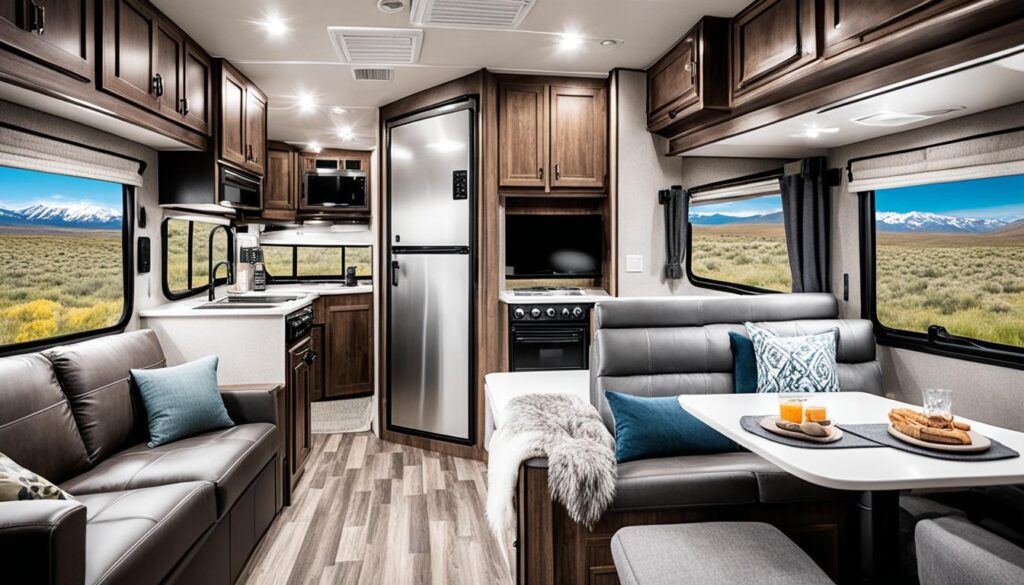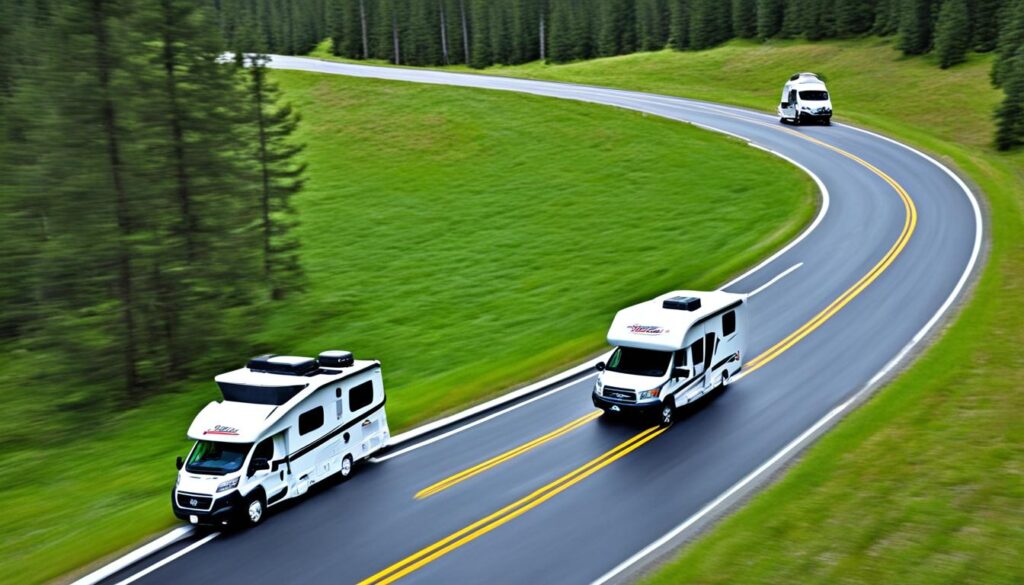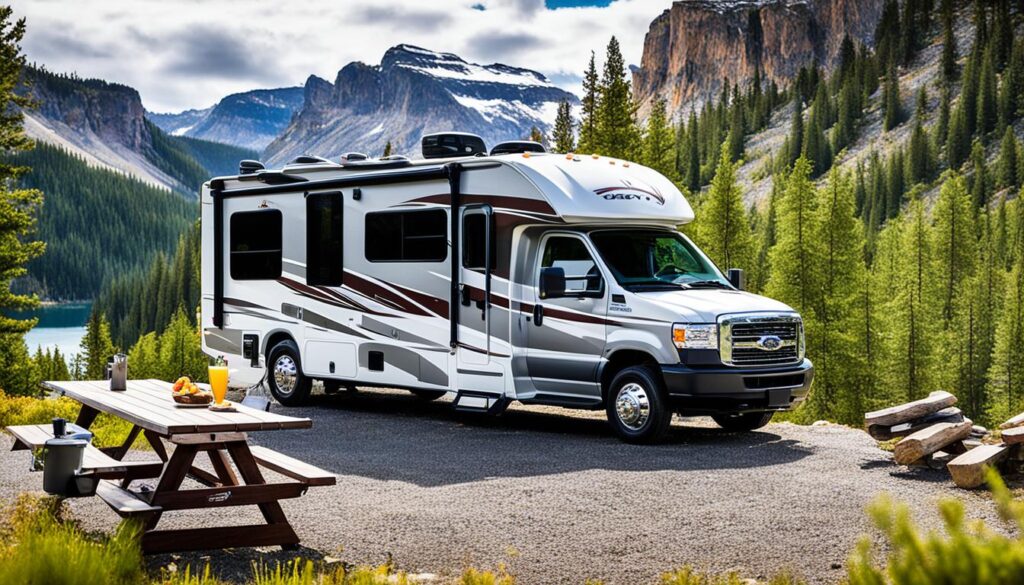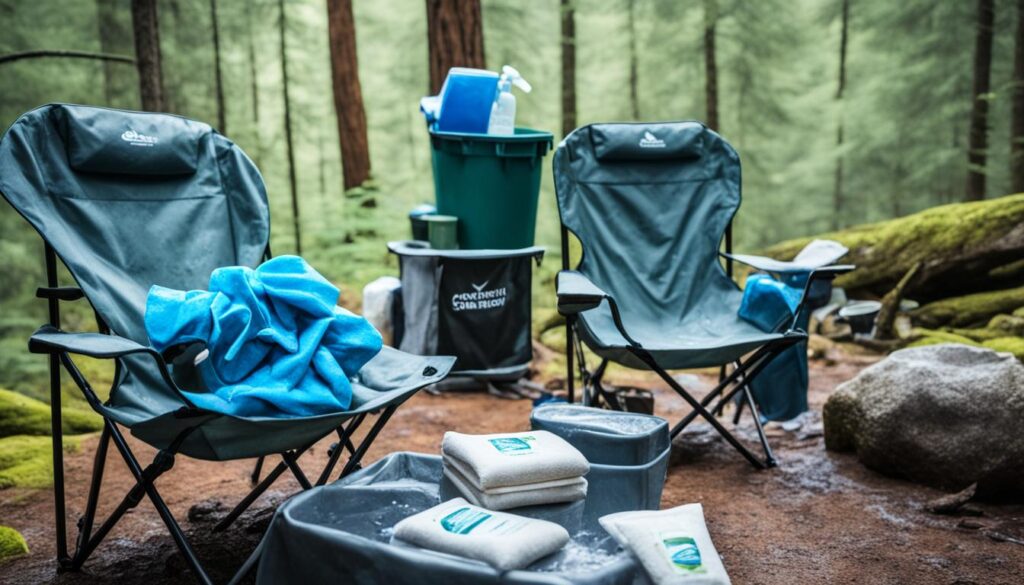Have you ever wondered what it would be like to take your home on the road? To have the freedom to explore new destinations, while still enjoying the comforts of your own personal space? If so, then you’re not alone. The world of recreational vehicles, or RVs, offers an exciting and versatile way to travel and experience the great outdoors. But what exactly is an RV, and how can it enhance your camping and travel adventures? Let’s dive in and uncover the secrets of these mobile homes on wheels.
Key Takeaways:
- RVs are motorized vehicles designed for living quarters that provide the convenience of mobility and a variety of built-in amenities.
- RVs can be rented from RV dealerships or parked at RV parks for camping and recreational purposes.
- Trailers are non-motorized units that must be towed by a separate vehicle and come in various types, including travel trailers, fifth wheels, and camping trailers.
- RVs offer home comforts on the road, such as sleeping areas, personal bathrooms, and kitchen facilities.
- RVs provide mobility and flexibility, allowing travelers to change plans on a whim and explore remote locations.
Contents
- 1 Types of Trailers
- 2 Home Comforts on the Road: Benefits of RVs
- 3 Mobility and Flexibility: Freedom to Explore with an RV
- 4 Cost-Effectiveness and Versatility of Trailers
- 5 Lifestyle and Travel Needs: Choosing Between an RV and a Trailer
- 6 Motorized Campers vs. Towable Campers: Steering Differences and Tips
- 7 Conclusion: Choosing the Right Recreational Vehicle for You
- 8 FAQ
- 9 Source Links
Types of Trailers
Trailers are a popular choice for outdoor enthusiasts who want to experience the freedom of the open road while enjoying the comforts of home. These non-motorized units are towed by a separate vehicle, allowing travelers to explore various destinations. There are different types of trailers available, each with its own unique features and benefits.
Travel Trailers
One of the most common types of trailers is the travel trailer. These trailers are hitched to the bumper of a towing vehicle, such as an SUV or a pickup truck. Travel trailers come in a range of sizes, from compact options suitable for couples or small families to larger models with multiple bedrooms and spacious living areas. They offer a variety of amenities, including sleeping quarters, kitchens, and bathrooms, ensuring a comfortable camping experience.
Fifth Wheels
Fifth wheels are trailers that require a special hitch installed in the bed of a pickup truck. This unique hitching mechanism allows for better weight distribution and stability during towing. Fifth wheels are known for their increased living space compared to travel trailers. They often feature multiple levels, providing a more residential feel. Some fifth wheels even have additional amenities like slide-out rooms, which further expand the available living space.
Camping Trailers
Camping trailers, also known as pop-up campers or tent trailers, are a lightweight and versatile option for outdoor enthusiasts. These trailers fold down for easy towing and storage but can be expanded to provide sleeping quarters, dining areas, and basic kitchen amenities. Camping trailers are a popular choice for those who enjoy a more rustic camping experience while still having the convenience of a dedicated living space.
Each type of trailer offers a unique way to experience the great outdoors and can be customized with various amenities to suit the traveler’s requirements. Whether you prefer the spaciousness of a fifth wheel, the maneuverability of a travel trailer, or the simplicity of a camping trailer, there is a trailer out there to enhance your camping adventures.
“Trailers are a versatile and convenient choice for travelers who want to explore the great outdoors without sacrificing the comforts of home.” – Travel Enthusiast
| Type of Trailer | Description | Key Features |
|---|---|---|
| Travel Trailer | Hitched to the bumper of a towing vehicle. Varying sizes and amenities. | Sleeping quarters, kitchens, bathrooms. |
| Fifth Wheel | Special hitch installed in the bed of a pickup truck. Increased living space. | Multiple levels, slide-out rooms (optional). |
| Camping Trailer | Lightweight and versatile. Folds down for easy towing and storage. | Sleeping quarters, dining area, basic kitchen amenities. |
Home Comforts on the Road: Benefits of RVs
One of the greatest advantages of traveling in an RV is the ability to have home comforts on the road. RVs provide a sleeping area, personal bathroom, and kitchen facilities, allowing travelers to sleep in their own bed, use their own bathroom, and cook in a kitchen equipped with familiar facilities. Some RVs even offer outdoor kitchens, perfect for al fresco dining and entertaining. The convenience of having these amenities onboard eliminates much of the discomfort associated with the on-the-go lifestyle and provides a sense of familiarity and comfort while traveling.
Personal Bathroom: Convenience and Privacy
An RV’s personal bathroom offers the convenience and privacy of having your own facilities on the road. Instead of relying on public restrooms or shared facilities at campgrounds, you have the luxury of a personal bathroom accessible whenever you need it. Whether it’s a quick pit stop or a relaxing shower after a day of outdoor activities, having a personal bathroom in your RV ensures comfort and convenience.
Kitchen Facilities: Cooking on Your Terms
RVs come equipped with kitchen facilities that allow you to prepare your own meals while on the road. This not only saves money on dining out but also gives you the freedom to cook according to your preferences and dietary needs. Whether you’re craving a hot breakfast, a home-cooked dinner, or a late-night snack, having a kitchen in your RV ensures that you have the necessary tools and space to prepare delicious meals on your terms.
Outdoor Kitchens: Al Fresco Dining and Entertainment
For those who enjoy the outdoor experience, some RVs are equipped with outdoor kitchens. These outdoor cooking areas provide the perfect setting for al fresco dining and entertaining. Imagine grilling burgers or cooking a gourmet meal amidst the beauty of nature. Outdoor kitchens in RVs enhance the overall camping experience, allowing you to fully enjoy the sights, smells, and tastes of the great outdoors.

Whether it’s the personal bathroom, kitchen facilities, or outdoor kitchens, RVs offer a range of comforts that make traveling a more enjoyable and convenient experience. The ability to sleep in your own bed, use your own bathroom, and cook meals to your liking creates a sense of familiarity and home while you’re on the road. RVs truly provide a home-away-from-home experience, allowing you to explore new places without sacrificing comfort and convenience.
Mobility and Flexibility: Freedom to Explore with an RV
One of the greatest advantages of traveling in an RV is the freedom to go wherever the road takes you. RVs provide the flexibility to change travel plans on a whim, visit remote locations, and stay longer in places that captivate you. Unlike staying in hotels or rented accommodations, an RV allows you to have your living quarters with you at all times. This mobility and flexibility open up a world of possibilities for exploring new destinations and experiencing the beauty of nature.
RV travel offers the unique ability to venture off the beaten path and discover hidden gems that are inaccessible to traditional forms of travel. With an RV, you can venture into remote locations, away from crowded tourist areas, and immerse yourself in the tranquility and serenity of the great outdoors. Whether it’s a secluded campsite by a pristine lake or a breathtaking viewpoint nestled in the mountains, RV mobility allows you to reach these remote locations and create unforgettable memories.
Traveling in an RV provides the freedom to follow your curiosity and explore destinations that are off the radar. It’s about breaking free from the constraints of traditional travel and embracing the journey wholeheartedly.
Imagine waking up to the sound of waves crashing on a secluded beach, or breathing in the crisp mountain air while surrounded by towering evergreen trees. With an RV, you have the freedom to wake up to a different view every day, choosing your backdrop from an array of breathtaking landscapes. Whether it’s a picturesque national park, a charming small town, or a stunning coastal stretch, an RV allows you to tailor your travel experiences to your preferences.
The flexibility of an RV also means that you can adjust and adapt your travel plans as you go. If you stumble upon a hidden gem that captures your heart, you can choose to extend your stay and savor every moment. On the other hand, if you find that a destination doesn’t quite meet your expectations, you have the freedom to move on and explore new horizons. RV travel gives you the power to shape your itinerary according to your desires and embrace the spontaneity of the open road.
RV mobility also allows you to escape the confines of popular tourist destinations and experience the true essence of a place. By steering away from crowded resorts and busy cities, you can discover the hidden cultural treasures that make each location unique. Whether it’s stumbling upon a local farmers market, discovering a charming mom-and-pop diner, or stumbling upon a breathtaking hiking trail, RV travel enables you to connect with the authenticity of your surroundings.
With the freedom to visit remote locations, an RV opens doors to incredible adventures and unforgettable experiences. It’s about embracing the journey, following your curiosity, and savoring the thrill of discovering the unknown. So pack your bags, hit the road, and let the RV take you on a transformative travel experience.
Cost-Effectiveness and Versatility of Trailers
In terms of cost-effectiveness, trailers offer a distinct advantage over RVs. Not only are trailers generally more affordable to purchase, but they also come with lower ongoing maintenance costs. This makes trailers a budget-friendly option for those seeking the joys of camping and travel without breaking the bank.
But affordability is not the only benefit of trailers. Their versatility adds to their appeal. Unlike larger RVs, trailers can be easily detached from the towing vehicle, allowing travelers to explore their surroundings without bringing the entire setup along. This flexibility in usage opens up a world of possibilities, providing the freedom to venture out and experience different attractions without the constraints of a cumbersome RV.
Towing and storage advantages further contribute to the versatility of trailers. When it comes to towing, trailers are generally easier to maneuver and control compared to larger RVs. Their compact size and lighter weight make them more agile, allowing for effortless navigation through tight spaces and winding roads. Additionally, trailers offer more convenient storage options. They can be stored in driveways, garages, or rented storage facilities, saving you the hassle and cost of finding dedicated RV parking spaces.
| Trailer Advantages | RV Advantages |
|---|---|
| 1. Cost-effective | 1. Spacious interiors |
| 2. Lower ongoing maintenance costs | 2. Built-in amenities like kitchen and bathroom |
| 3. Easy detachment from towing vehicle | 3. All-in-one living quarters |
| 4. Maneuverable and convenient in tight spaces | 4. Freedom to move without towing and setting up |
| 5. More storage options | 5. Luxury features and customization |
“Trailers provide a cost-effective and versatile option for camping and travel.”
Whether you’re looking for a more affordable camping experience, a compact and maneuverable travel companion, or simply the convenience of detachability, trailers offer a range of advantages that make them a compelling choice. Consider your budget, travel preferences, and storage capabilities when making your decision, and enjoy the freedom and flexibility that comes with owning a trailer.
Lifestyle and Travel Needs: Choosing Between an RV and a Trailer
When it comes to embarking on a nomadic journey or setting up a stationary camp, choosing between an RV and a trailer is a crucial decision. Each option offers unique benefits and considerations that cater to different lifestyle and travel needs.
If the RV lifestyle resonates with you and you desire the convenience of having a mobile living space, especially if you plan on full-time travel, an RV, particularly a motorhome, may be the perfect choice. With an RV, you have the freedom to explore new destinations, experience adventures on the road, and enjoy the comforts of a home while on the go. It’s like having a house on wheels, providing unparalleled convenience and flexibility.
On the other hand, if your preference is to set up a stationary camp in one location and explore your surroundings in a smaller vehicle, a trailer may be more suitable. Trailers offer the flexibility of detaching from the towing vehicle, allowing you to leave your camping setup behind and explore in a smaller, more agile vehicle. This option provides the benefits of having a dedicated living space while allowing you to navigate more easily through tight spaces and embark on local adventures.
It’s crucial to consider practicalities like establishing a legal domicile and address requirements, especially if you plan on living full-time in your RV. Depending on your country or state regulations, you may need to choose a legal domicile for tax purposes or other considerations. Address requirements may also be necessary for various paperwork, registrations, and receiving mail. These factors should be taken into account to ensure compliance with legal obligations and to make your RV lifestyle hassle-free.
Budget constraints and maintenance considerations are also essential factors to consider when deciding between an RV and a trailer. Both options come with their own costs and upkeep responsibilities. RVs, with their motorized components and built-in amenities, may require more maintenance and higher initial costs compared to trailers. Trailers, on the other hand, may have lower purchasing costs and ongoing maintenance expenses. It’s important to assess your budget and weigh the financial implications of each choice to make an informed decision.
In the end, the choice between an RV and a trailer boils down to personal preferences, travel needs, and practical considerations. Whether you prioritize the freedom and convenience of an RV lifestyle or the flexibility and maneuverability of a trailer, selecting the right option will ensure a fulfilling and enjoyable travel experience.
Key considerations when choosing between an RV and a trailer:
- Travel preferences: nomadic living or stationary camp setup
- Legal domicile and address requirements
- Budget constraints and maintenance costs
Pros and cons of RVs and trailers:
| RV | Trailer |
|---|---|
| Convenience of mobility and on-the-road comforts | Flexibility to detach and explore in a smaller vehicle |
| Ability to change travel plans and visit remote locations | Lower purchasing costs and ongoing maintenance expenses |
| Establishing a legal domicile and address requirements | More maneuverability and convenience in tight spaces |
Motorized Campers vs. Towable Campers: Steering Differences and Tips
When it comes to choosing between motorized campers and towable campers, understanding the steering differences is essential for a safe and enjoyable journey. Motorized campers, such as motorhomes, provide direct steering mechanisms similar to large trucks or buses. This design offers more immediate control over the vehicle’s direction, but it can have wider turning radii, making tight maneuvers challenging.
Towable campers, like trailers, have indirect steering through the towing vehicle. Drivers must consider the length and pivot point of the trailer when turning, necessitating wider turns to avoid obstacles. Reversing with a towable camper also requires skill and practice to maintain control.
To ensure a smooth driving experience with both types of campers, here are some practical tips:
- Practice driving in open areas: Familiarize yourself with the handling and maneuverability of your specific camper. Practice turning, parking, and reversing to build confidence behind the wheel.
- Be aware of height and side clearances: Motorized campers and towable campers have different dimensions. Pay close attention to the height and width of your camper to avoid collisions with low bridges, overhanging branches, or side obstacles.
- Take wide turns: Due to their size and weight distribution, both motorized campers and towable campers require wider turns than regular vehicles. Plan your turns in advance and position your camper accordingly to avoid curbs or other vehicles.
- Plan routes with size constraints in mind: Some roads, bridges, and campsites have restrictions on vehicle size. Before embarking on your journey, research and plan routes that accommodate the dimensions of your camper.
By following these driving tips and understanding the steering differences between motorized campers and towable campers, you can navigate the roads confidently and safely, ensuring a smooth and enjoyable adventure.

Conclusion: Choosing the Right Recreational Vehicle for You
When it comes to choosing the right recreational vehicle (RV) for your adventures, there are several factors to consider. Your individual travel needs, budget constraints, and maintenance considerations all play a crucial role in making an informed decision.
First and foremost, think about how many people will be traveling with you and the desired amenities. RVs offer the convenience of a home on wheels, providing comfortable living spaces, fully equipped kitchens, and personal bathrooms. They are perfect for those who prioritize comfort and flexibility in their travels. On the other hand, trailers provide a cost-effective and versatile option. With various types available, such as travel trailers and fifth wheels, you can customize the level of amenities to suit your preferences.
Budget constraints are another significant consideration. RVs generally have a higher upfront cost and ongoing maintenance expenses. However, if you plan to travel extensively and value the convenience they offer, investing in an RV may be worthwhile. On the other hand, trailers are typically more affordable, making them an attractive option for individuals looking to enjoy camping and travel without breaking the bank.
Maintenance considerations should not be overlooked. RVs require regular maintenance, such as engine care, plumbing checks, and appliance upkeep. If you have limited time, budget, or technical knowledge, trailers may be a more manageable choice. They are easier to maintain, with fewer complex systems and engines to worry about.
By carefully considering your travel needs, budget constraints, and maintenance considerations, you can choose the perfect recreational vehicle that aligns with your specific wants, needs, and resources. Whether you opt for the convenience and flexibility of an RV or the affordability and versatility of a trailer, your chosen vehicle will serve as your home away from home, allowing you to embark on memorable adventures wherever the road takes you.
FAQ
What is an RV?
An RV, or Recreational Vehicle, is a motorized vehicle designed for living quarters. It provides the convenience of mobility and comes with a variety of built-in amenities such as sleeping quarters, kitchens, and bathrooms. RVs offer the comforts of home while on the road and allow for flexibility in travel plans.
What are the different types of trailers?
Trailers come in various types, including travel trailers, fifth wheels, and camping trailers. Travel trailers are hitched to the towing vehicle’s bumper, while fifth wheels require a special hitch installed in the bed of a pickup truck. Camping trailers are specialized trailers with amenities similar to those of a camper.
What are the benefits of RVs?
RVs provide the convenience of home comforts on the road. They offer a sleeping area, personal bathroom, and kitchen facilities, allowing travelers to sleep in their own bed, use their own bathroom, and cook in a familiar kitchen. Some RVs even have outdoor kitchens for al fresco dining. RVs eliminate much of the discomfort associated with traveling and provide a sense of familiarity and comfort.
How does an RV offer mobility and flexibility?
RVs allow travelers the freedom to go wherever the road takes them. They provide the flexibility to change travel plans on a whim, visit remote locations, and stay longer in places that captivate them. Unlike staying in hotels or rented accommodations, an RV allows travelers to have their living quarters with them at all times, offering mobility and flexibility.
Are trailers more cost-effective compared to RVs?
Yes, trailers are generally more affordable to purchase and have lower ongoing maintenance costs compared to RVs. They also offer versatility in usage. Trailers can be easily detached from the towing vehicle, allowing travelers to explore their surroundings without bringing the entire setup along. Trailers are also easier to tow and store, making them more maneuverable and convenient in tight spaces.
How do I choose between an RV and a trailer?
The choice between an RV and a trailer depends on individual lifestyle and travel needs. If you desire a nomadic lifestyle and having a mobile living space, an RV, especially a motorhome, offers unparalleled convenience. On the other hand, if you prefer setting up a stationary camp and exploring in a smaller vehicle, a trailer might be more suitable. Practicalities like legal domicile, budget constraints, and maintenance considerations should also be taken into account.
What are the differences between motorized campers and towable campers?
Motorized campers, such as motorhomes, have direct steering mechanisms like that of a large truck or bus. They offer more immediate control over the vehicle’s direction but can have wider turning radii, making tight maneuvers challenging. Towable campers, such as trailers, have indirect steering through the towing vehicle. Drivers must account for the length and pivot point of the trailer when turning, requiring wider turns to avoid obstacles. Reversing with a towable camper also requires skill and practice.
How do I choose the right recreational vehicle?
Choosing the right recreational vehicle depends on individual travel needs, budget constraints, and maintenance considerations. Factors like the number of people traveling, desired amenities, and intended use should be considered. By considering these factors, individuals can find the perfect recreational vehicle that aligns with their specific wants, needs, and resources.
Source Links
- https://www.chicagovanrentals.com/blog-detail/exploring-the-world-of-recreational-vehicles-meaning-types
- https://www.rvpostings.com/blogs/understanding-the-differences-rv-camper-motorhome-and-trailers-article-103
- https://wisefrontierliving.com/rv-or-trailer-understanding-the-differences-and-benefits/






